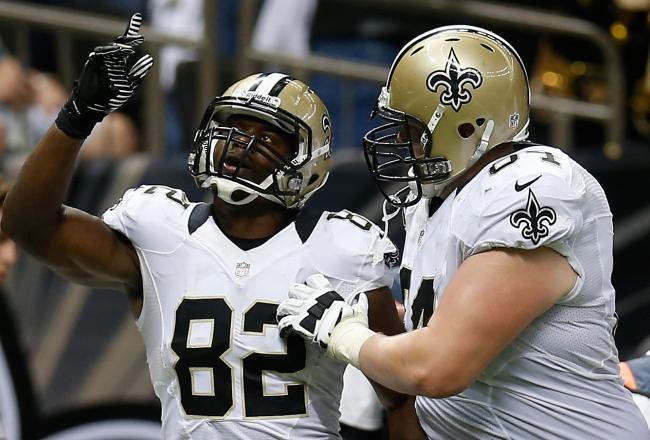 Sitting in a Target parking lot near Clearview Mall in New Orleans, Benjamin Watson opened the Notes app on his phone and wrote something that would end up touching America.
Sitting in a Target parking lot near Clearview Mall in New Orleans, Benjamin Watson opened the Notes app on his phone and wrote something that would end up touching America.
The day before, Watson, the backup tight end for the New Orleans Saints, watched his team fall to the Baltimore Ravens, 34-27, on Monday Night Football. As the evening ensued, however, their seventh loss of the season became the least of his concerns. By the time he left the stadium, the country had entered into a state of havoc over the Ferguson, Mo., grand jury’s decision not to indict police officer Darren Wilson in the shooting and killing of 18-year-old Michael Brown, one of many recent altercations in which an African American has been the victim of a Caucasian police officer.
As Watson processed his emotions throughout Monday night and during the day on Tuesday, he finally decided to put them into words while his wife was inside Target on Tuesday night. He sat in their car, monitoring his four children who were watching a movie in the backseat, and started writing.
He transparently expressed his feelings about the situation—his anger, frustration, fear, embarrassment, sadness, sympathy, displeasure, confusion, introspectiveness, hopelessness, hopefulness, and confidence. His 650-word essay, which he posted on Facebook that evening, struck a chord with America.
In three days, it accumulated more than 700,000 likes and 400,000 shares. The post was heralded for its objectivity, honesty and ability to resonate with both black people and white people despite the divisiveness of the issue he was addressing. One week after the post was published, Watson’s publicist said it had been viewed more than 44 million times.
“I just had all of that inside of me and didn’t know what to do with it,” Watson says. “It’s amazing how, once you start writing, more stuff comes out, and it’s like, ‘Okay, I really do feel this way.’ Is there a solution to this? What would God have to say about this? You try to take what you feel and look at it with a proper perspective and a biblical perspective. That’s the most important thing.”
As much of an influence as the post had on others, seeing its impact also had an effect on Watson.
“It’s amazing that the biggest platform I’ve ever had in my life, which was at this point, had nothing to do with football,” Watson reflects. “It’s like God is saying, ‘I can use your football, but I don’t need your football. I just need you to be obedient. I gave you some words to say, I gave you some thoughts, I gave you this ability to write things down, now you be obedient, write it down, send it out, and if I want to, I’ll blow it up. If not, the right person will see it at the right time.’ That’s what I’m taking from it. He is sovereign, and He is in control of everything.”
The Teddy Bear
Benjamin Watson is no different than most men.
Throughout his career, he has battled his tendency to place his identity and his sense of self-worth in his accomplishments.
Watson, being a tight end in the NFL, wants to catch passes and score touchdowns. He has naturally become agitated in the past when he is not doing those things, when he is not excelling or does not appear to be excelling at one of his biggest passions in life: football. Often, these feelings are amplified within athletes because of the pressures from fans and media to perform, and, consequently, the temptation to believe other people’s opinions about your performance.
“Like any job, football is performance driven,” Watson says. “I was talking to someone the other day about how every coach is a three- to four-game losing streak away from getting fired. There is little to no job security in athletics. It’s really easy to have your identity—and your identity being your self-worth and your attitude, whether you are joyful or sad or miserable—all caught up in how well you did, wins and losses, statistics, playing time, injuries, fan mail. Those things. You see guys all over the place. It’s very easy to get caught into that. Part of that is what drives you. Part of it is healthy. But what Christ did for us gives us our identity.”
His father, Ken Watson, a pastor in Rock Hill, S.C., says that he noticed perfectionistic and competitive qualities in Benjamin in his youth.
Each evening before Benjamin went to bed, Ken would enter into his room with a gigantic teddy bear. He would wrestle Benjamin with the teddy bear until someone won. Usually, he would let little Benjamin win. One night, however, he decided to pin Benjamin to the ground with the teddy bear.
Ken retired to his bedroom, and remembers lying in bed with his wife, both of them wide-eyed, unable to fall asleep as they listened to Benjamin’s incessant cries and screams from his bedroom.
“Maybe you should just take the teddy bear back in there and let him win,” his wife suggested.
The scene might have come from Benjamin’s childhood, but it seems to represent much more.
The reality is that most people throw a fit when they lose or fail to perform. And throughout his NFL career, Watson has been on a continual journey of combatting his emotions revolving around his performance with truth—real truth.
Winning and Losing
As Watson grew older, he might not have been wrestling a teddy bear anymore, but he was playing football. The core issue—a misplaced identity in his performance—always seemed to exist or arise or appear.
“In college, I remember that he struggled with that,” Ken says. “One time, he came home and said, ‘Dad, I really struggle with my identity outside of football.’ When you are a perfectionist, and you find your identity in what you do, that is a heavy burden…I gave him this book to read called The Search For Significance—it talks about how we try to find significance in what we do and not who we are in the Lord.”
Watson’s “search for significance” continued as he entered the NFL. Drafted 32nd overall in the 2004 NFL Draft by the New England Patriots, the most prominent football dynasty of the 21st century, Watson experienced immediate success.
In his first season, he and the Patriots won the AFC Championship and went on to defeat the Philadelphia Eagles, 24-21, in Super Bowl XXXIX. The Patriots also won the AFC Championship in their undefeated 2007 campaign; Watson was third on the team with six touchdown catches.
“At New England, if he had a great game but dropped one ball, he was always thinking about the one ball that he dropped,” Ken says.
In 2010, the Cleveland Browns signed him to a three-year deal. Transitioning from the world-renowned Patriots to the struggling Cleveland Browns, who had only been to the playoffs once in a 16-year span, was difficult.
“When he went to Cleveland, it was a whole different way of doing things, but the main thing was that they weren’t winning a whole lot,” Ken says. “One day, I called him and said, ‘You play different.’ He said, ‘What do you mean?’ I said, ‘You kind of walk different.’ He said, ‘It’s funny you said that because I feel like I’m playing with a lot less stress. I’m playing with more confidence. I’m playing for the Lord.’ I think the New England thing was wonderful for him to experience high pressure, but I think through that whole aspect of losing, God began to work more on his character, and I think he became more in touch with that.”
Watson says that God continued to use football as a tool to make him into a better person.
“That’s one thing I love about football; it teaches you to have humility for the greater good,” Watson says. “Our identity has to be in Him. Our value is in Him. Our value is no higher or lower because of winning a championship or losing every single game. Our value may change amongst people, but our true value will never change. I constantly have to pound it into my head—when I’m scoring and when I’m not—that my value is the same. There is no reason for me to come home and be upset and be snapping at people—because my value is still the same. There is no reason for me to be on Cloud 9 when things are going well—because my value is the same as it was before.”
“It doesn’t mean you won’t be happy or sad; you should be happy or sad with winning or losing; but your value, your self-worth, doesn’t change. God loved us so much He sent His son for us, and our identity has to be grounded in Him. It’s a tough thing. It’s something I have to preach to myself and something I have conversations with guys all the time. Because you’ll be all over the place. You’ll be a miserable, stressed-out mess if you go up and down with people’s opinions of how well you performed or your own opinion of how well you performed.”
Playing and Not Playing
Watson immediately became a fixture in the Browns offense in 2010 and racked up the best numbers of his career, totaling a team-high 68 receptions and 763 yards, which ranked third in the NFL for tight ends.
“The anticipation was, on my part, that he would play on the Pro Bowl team that year,” Ken says. “But he didn’t make the Pro Bowl, so he would have at least thought ‘I’d be on the alternate team,’ but he didn’t make that.”
The situation represented much more than the present disappointment and frustration; it reflected the world and its ploys—the highs and lows of winning and losing, the inconsistencies of acceptance and rejection.
It was also a hint of foreshadowing, perhaps, of what would come two years later after a pair of stellar seasons with the Browns. Watson, entering his 10th season and still performing at a high level, was signed by the Saints in 2013 to back up one of the best tight ends in the league, Jimmy Graham. This, of course, meant that his role was about to significantly change. He would be catching less balls and scoring less touchdowns, even though he could be a starting tight end for just about any other team in the league, simply because he was behind one of the best.
“God has showed me that the most important thing is not football—it’s very important—but the most important thing is how you are speaking into these guys’ lives,” Watson says. “Even though it’s tough and I get frustrated during games not catching balls, and I do get frustrated with my role sometimes, God has really taught me that the most important role you can have is to affect people eternally. What is it that you are pouring into your teammates’ lives? Are you telling them about the Lord? Have you showed them you can have joy in every situation? Are you showing them how to deal with adversity when things aren’t going their way? Are you showing them how to handle success when things are going their way? Being a father and a husband, I’m trying to teach some of the younger players about the things I’ve messed up on, and the things I’ve done well; I just want to be a resource for them when it comes to life.”
Playing a much different role in a much different New Orleans offense, Watson only caught two touchdown passes in the 2013 season while backing up Graham, who led the league in receptions (86) and yards (1,215).
In 2014, Watson went 12 weeks without catching a single touchdown pass and once again saw himself sinking into the frustrations associated with a performance-based mentality that has constantly crept up on him throughout his career.
“We talk a lot and he says, ‘Dad, I know my significance is not in what I do. I know that. I just pray that I’ll be able to live it,’” Ken says. “When you are an athlete on the top and you want to be the best you can be, and you are a receiver, all you want to do is catch the ball. He has had some struggles sometimes with it, but I think that makes you real. Sometimes I think part of the struggle is that he’s thinking, ‘I know I can still do this. But my role is not to do this. What do people think about me now that I’m not doing it now?’”
In Week 13, one week after his Facebook post went viral, Watson caught a 15-yard touchdown pass, his first of the year, en route to the Saints’ 35-32 victory against the Pittsburgh Steelers.
“I was in shock and awe,” Watson says. “I almost wanted to start crying…I looked up and was like, ‘Thank you, Lord.’”
Ironically, the touchdown came at a time when no one was talking about Watson’s play on the field but people were talking, rather, about his elegant essay on the happenings in Ferguson, Mo.
Even players on the Steelers, his opponents, were complimenting him on his post in between plays in the middle of the game while he was on the field—perfect imagery that his platform, in this given circumstance, transcended sports.
In the coming week, Watson would be featured on CNN, FOX News, and MSNBC and the Dr. Phil Show, not because of his touchdown, but because of a platform he never expected to have.
“That’s the thing about touchdowns,” Watson says. “You will always need another one. That’s the trap you have to be careful of in whatever work you are in. It will get old very quickly. If you don’t have an eternal mindset, and if you aren’t storing up treasures in heaven, things that won’t rust away, you will always need more and more.”
“I had been struggling with all those things leading up to that week. All the stuff I felt like I wanted, notoriety and all that through football, came through something totally different. God is like, ‘If I want them to know your name, I’ll let them know your name; if not, I won’t. So just trust me in what I’ve assigned you to do, and I’ll take care of the rest.’”
Unexpected Platform
In the days following Watson’s touchdown catch, Ken Watson walked into a barbershop in Rock Hill, S.C.
Ken noticed the barbers had printed off a piece of paper with Watson’s Facebook post and had been passing it around and reading it.
“Man, that was unbelievable,” said one of the barbers when Ken walked in.
“Martin Luther King couldn’t have written a thing like that!” said another.
“Man, Mr. Watson,” another said, “your kids never stop doing things that make you proud.”
Days after catching his first touchdown pass of the season, no one was talking about Benjamin Watson’s football successes. They were talking about how God used him to move America in a way that went far beyond football.
“I just told him, ‘Benjamin, I’m really proud of you because you exalted the Lord,’” Ken says. “I tell all my kids about Psalm 75—‘Promotion comes not from the east or from the west, it comes from the Lord.’ When God wants to elevate you to use you, he knows where to find you.”
“People are gravitating to it because it struck a nerve. It wasn’t an article that casted blame but it challenged self-examination on everybody’s part. To cross racial lines? That’s not an everyday conversation that you get in the barbershop.”
By Stephen Copeland
This story was published in the Winter 2014 print issue of Sports Spectrum magazine.





